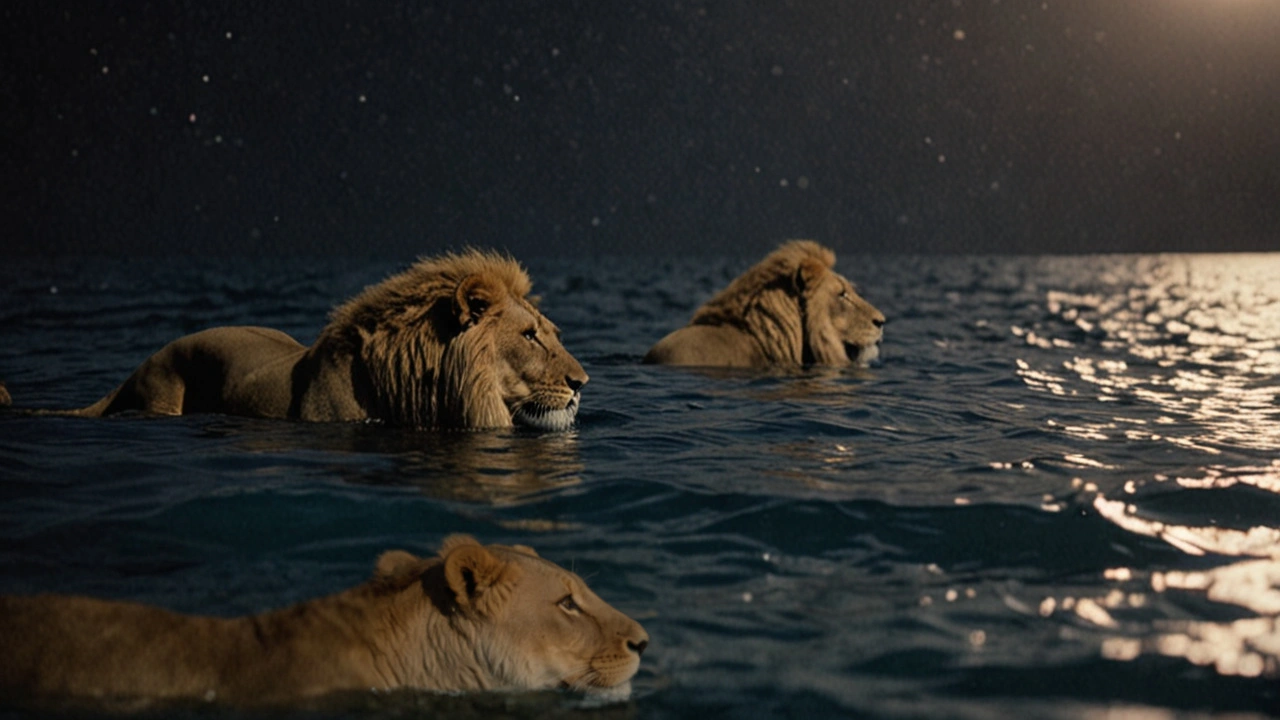Record-Shattering Swim by Lion Brothers Across Uganda's Kazinga Channel in Search of Mates
Introduction
In an extraordinary display of determination and resilience, two lion brothers, Jacob and Tibu, have accomplished a feat that has captured the attention of wildlife enthusiasts and researchers alike. The pair embarked on an ambitious journey, swimming 1.5 kilometers across the Kazinga Channel in Uganda in search of potential mates. This daring escapade, documented using advanced heat-sensing cameras mounted on drones, is a testament to the lengths wild animals will go to for survival and procreation.
The Brothers and Their Journey
Jacob and Tibu are not your average lions. Their story is one of resilience and survival against all odds. Jacob, the elder of the two at 10 years old, has a particularly poignant history. He has survived numerous life-threatening situations, including the loss of a leg to a poacher's trap. Jacob's indomitable spirit and his bond with his brother Tibu have been crucial in their survival. Their latest endeavor, swimming across the Kazinga Channel, has set a new record in the annals of wildlife behavior. The Kazinga Channel is not an easy waterway to cross. It spans 1.5 kilometers and is teeming with potential dangers, from strong currents to predators. Yet, the brothers plunged into the water with a singular goal in mind: to find potential mates and ensure the continuation of their lineage.
The Role of Technology in Wildlife Research
The incredible journey of Jacob and Tibu was captured in stunning detail thanks to the use of advanced technology. Heat-sensing cameras mounted on drones provided researchers with unprecedented footage of the lions' swim. Dr. Alexander Braczkowski, a researcher affiliated with Griffith University's Center for Global Health and Nutritional Safety, led the project. The use of drones in wildlife research has revolutionized the way scientists gather data. In the case of Jacob and Tibu, it allowed researchers to observe the lions in their natural habitat, undisturbed by human presence. This technology also provided valuable insights into the behavioral patterns of these majestic creatures.
Challenges Facing Wildlife in Uganda
The lions' journey across the Kazinga Channel is more than just a quest for mates. It highlights the numerous challenges facing wildlife in Uganda and beyond. Human activities have increasingly encroached on natural habitats, leading to a dearth of suitable environments for wild animals. The national park, where Jacob and Tibu reside, has seen a significant reduction in the number of female lions, driving the brothers to take unprecedented measures in their search for partners. The loss of habitat is a pressing issue in conservation efforts. It forces animals to take more significant risks in their movements, often bringing them closer to human settlements. This increase in human-wildlife interaction can lead to conflict, putting both parties at risk. Jacob's earlier encounter with a poacher's trap is a grim reminder of the dangers that these magnificent creatures face.
The Importance of Conservation Efforts
The perilous quest of Jacob and Tibu underscores the importance of conservation efforts. Preserving the natural habitats of wild animals is crucial for their survival. Organizations and researchers are working tirelessly to implement measures that protect these environments and ensure that wildlife can flourish. Community involvement is also a critical component of successful conservation strategies. Educating local populations about the importance of wildlife preservation and promoting coexistence can significantly reduce human-wildlife conflicts. Efforts to curb poaching are also essential. Stricter regulations and enforcement can help protect endangered species from falling victim to illegal hunting.
The Future for Jacob and Tibu
As Jacob and Tibu continue their journey, their story serves as an inspiration and a call to action. These lions have shown remarkable resilience in the face of adversity, and their quest for survival highlights the urgent need to address the issues threatening wildlife. Researchers and conservationists will continue to monitor the brothers, using the data gathered to inform future conservation strategies. It is hoped that their journey will contribute to a greater understanding of lion behavior and the challenges these animals face in the wild. In the grand tapestry of nature, the story of Jacob and Tibu is a poignant reminder of the delicate balance that exists between humans and wildlife. By working together, we can ensure that this balance is maintained, allowing future generations to witness the majesty of lions and other wild creatures in their natural habitats.






